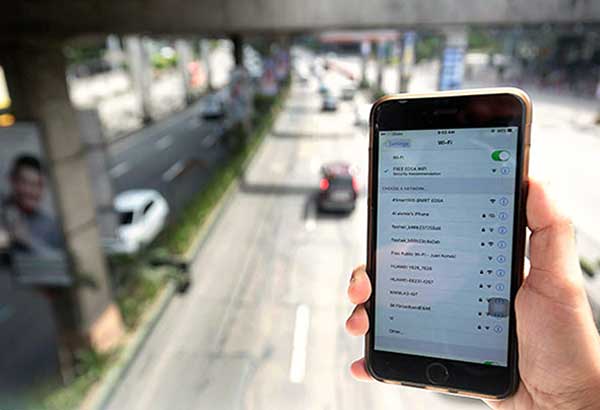Commentary: E-governance readiness is critical for COVID-19 response

A commuter shows off his smartphone’s free wifi connection at an MRT-3 station along EDSA.
It was recently announced that some local government units (LGUs) have begun to partner with telecommunications companies to improve COVID-19 response capacities.
These are welcome developments indeed, given the critical role of technology and e-governance in efficiently and effectively responding to citizens' evolving needs during this health crisis.
The local government of Antipolo, for instance, partnered with Globe Telecom to provide access to GoWiFi services in city hall and in key hospitals around the city. This service provides LGU personal and health professionals with secure and reliable internet access that allows them to offer telemedicine services and connect with constituents.
In addition, Antipolo citizens can also access the free service, helpful in staying in touch with family, remote work, and staying informed on LGU activities and COVID-19 related announcements.
In Mandaluyong, the LGU there is using Globe's GoWiFi and Automated Mobile Blaster (AMBER) services, as well. Through the AMBER platform, Mandaluyong City can easily send important community announcements on COVID-19 and emergency preparedness to multiple recipients simultaneously, regardless of the network service provider.
In this era of rapid digitization, adopting digital tools and e-governance practices in government operations holds much potential, not only for the government to improve the delivery of public services but also to deepen citizen engagement.
Indeed, the global COVID-19 pandemic has bolstered the role of e-governance in countries around the globe as more governments pushed to incorporate technology into their operations in response to the health and economic crisis.
For instance, early in the pandemic, the Singaporean government used a mobile app called "Trace Together" to help with contact tracing that effectively slowed the spread of the virus.
Also, last year, as India started to open its economy, the government of Delhi created an online employment exchange platform. The website allowed job seekers to register and connect with employers, which reports connected citizens with over a million jobs in the first few weeks.
With this global backdrop of rapid e-governance adoption, the United Nations (UN) released its most recent E-government Development Index (EGDI) in 2020. According to the UN report, "the evolving pandemic created opportunities for e-government to serve the public in new and vital ways. However, it has also heightened digital divides, as many among the poorest and most vulnerable in society lack access to digital government services and support."
In the latest EDGI, the Philippines ranked 77th out of 193 countries, two spots lower than its rank in 2018. However, the country's performance in the e-governance index is without some bright spots.
The UN's EGDI is measured based on three indices: the Telecommunication Infrastructure Index, the Human Capital Index, and the Online Service Index. In terms of the Telecommunication Infrastructure Index, the country's score improved from 35% in 2018 to 58% in 2020 and is above the world average of 54%.
Here on the ground, the improvements in the country's telecommunications infrastructure is also reflected in the most recent Ookla 2021 Speedtest Global Index, which found that the country's average mobile internet download speeds have doubled in just one year.
In addition, fixed broadband download speeds have also improved and have kicked the Philippines 47 spots up in the speed test index to 62nd from 109th last year.
In terms of the UN's Human Capital Index, which counts the quality and quantity of education as one of its key pillars, the Philippines' score also improved from 71% in 2018 to 75% in 2020. Undoubtedly, vital to the country’s performance in this index is its ability to adjust to remote education, given the prolonged lockdowns.
For this reason, the government must support the country's education sector. The pandemic has pushed many private educational institutions to the brink of closure due to reduced enrolment numbers and the threat of higher taxes. If the country is to improve its human capital and digital readiness, it must ensure that quality education remains a top priority during this pandemic.
Of the three components of the EGDI, it was only the Online Service Index where the Philippines' score dropped from 88% to 73% in the UN's most recent report. Also called the Web Measure Index, this index is based on a four-stage model that measures the government's online presence and the sophistication of their citizen services.
In this model, the first stage of e-government evolution, called Emerging presence, is when the government's online presence is limited to government websites that offer only static information to citizens with few options for engagement.
Thankfully, with the growth of internet adoption and the use of social media in the country, the days of static government websites are (almost) entirely behind us. Furthermore, through initiatives of proactive LGUs, like Antipolo and Mandaluyong, with their partnerships with the private sector, citizens are also better able to access up-to-date health information through community announcement platforms.
Not only that, but citizens are also able to engage more directly with the government through the free internet access being provided by the city and its partners.
That said, there is much space for improvement. Keep in mind that in terms of e-governance evolution, on the top end of the spectrum are governments with a Connected presence.
This fourth stage of e-government evolution allows for two-way interactions between citizens, businesses, and governments. It also encourages participative decision-making and proactively seeks out citizens' views on policies and programs.
The country's e-governance readiness journey has a way to go, but our strong Telecommunications Infrastructure and Human Capital serve as a solid foundation to build upon. Indeed, the pandemic has created opportunities for e-government to serve the public in new and vital ways.
We must ensure that policies and programs are in place to encourage innovation in this space rather than worsen digital divides at this critical time.
Paco Pangalangan is the executive director of think tank Stratbase ADR Institute.
- Latest
























